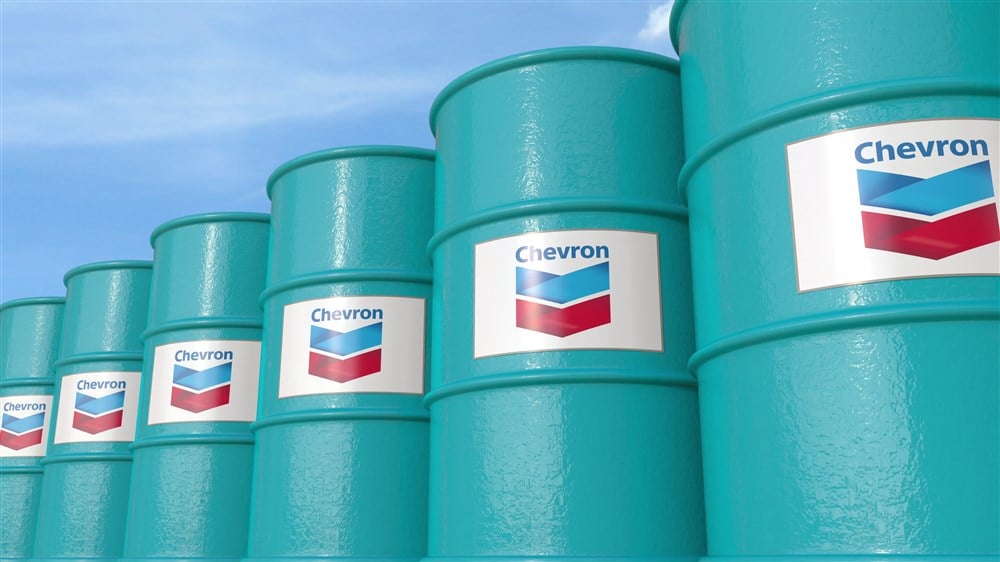
Shares of Chevron Corp. (NYSE: CVX) gapped down hard on October 23 after saying it would buy fellow S&P 500 component Hess Corp. (NYSE: HES) in an all-stock deal valued at $53 billion.
Under terms of the agreement, Hess shareholders will receive 1.0250 shares of Chevron for each Hess share.
The deal comes on the heels of Exxon Mobil's (NYSE: XOM) $59.5 billion acquisition of Pioneer Natural Resources Co. (NYSE: PXD), with both stocks rallying in the days following the announcement.
This latest big oil industry transaction is yet another indication that, to paraphrase Mark Twain, reports of fossil fuels' death are greatly exaggerated. Despite efforts to develop cleaner sources of energy, some of which have been successful and show tremendous potential, fossil fuels still have the capability to generate power the world needs right now.
While green energy is undoubtedly a future growth industry, global fossil fuel demand hasn't yet peaked, according to the International Energy Agency. The organization expects policy-driven ramping up of clean energy capacity to send fossil fuel demand 25% lower by 2030 and 80% lower by 2050.
In other words, while demand is forecast to start declining this decade, fossil fuels will be around for the foreseeable future.
Growing Production Through Acquisition
The Chevron-Hess deal underscores the need for continued investment in that area. Exxon Mobil's acquisition of Pioneer is designed to beef up Exxon's production in the Permian Basin, a prolific oil-rich region in West Texas and New Mexico.
In its announcement about the Hess acquisition, Chevron cited the strength of Hess' Bakken assets, an oil-and-gas shale formation in North Dakota.
The Bakken assets, Chevron said, "add another leading U.S. shale position to Chevron's DJ and Permian basin operations and further strengthen domestic energy security."
It also cited the addition of the Stabroek Block in Guyana, calling it "an extraordinary asset with industry-leading cash margins and low carbon intensity that is expected to deliver production growth into the next decade."
The Stabroek Block, located approximately 120 miles offshore Guyana, consists of 6.6 million acres, or equivalent in size to 1,150 Gulf of Mexico blocks. Hess holds a 30% interest in the block, which is operated by Exxon Mobil.
Based on the discoveries on the block to date, Hess expects gross production capacity of more than 1.2 million gross barrels of oil per day by the end of 2027.
In April 2018, Hess also acquired an interest in the Kaieteur Block, located approximately 155 miles offshore and adjacent to the Stabroek Block. The Kaieteur Block covers 3.3 million acres, equivalent in size to more than 580 deepwater blocks in the Gulf of Mexico.
Free Cash Flow Expected to Grow Faster
That, too, will become part of Chevron's portfolio.
In the deal announcement, Chevron added that the combined company is expected to grow production and free cash flow at a faster rate and for longer than Chevron's current five-year guidance.
In the statement, Chevron CFO Pierre Breber said, "With greater confidence in projected long-term cash generation, Chevron intends to return more cash to shareholders with higher dividend per share growth and higher share repurchases."
Currently, Chevron's dividend yield is 3.76%, and the company has a 37-year track record of boosting the shareholder payout. That lands it a spot on MarketBeat's dividend achievers list.
Hess' dividend yield is 1.09%; the company increased its dividend in each of the past two years. The company rebounded to profitability in 2021 after several consecutive years of losses.
Energy Stocks Trading Lower
Chevron stock fell 1.80% at the open and was trading about 3% lower as of mid-day.
Hess shares opened higher but were also trading in the red mid-session. The stock was trading near $160.64, below Chevron's offer price of $171 a share.
The Energy Select Sector SPDR Fund (NYSEARCA: XLE) was trading lower on October 23 as oil prices fell. Factors affecting oil prices include greater output from U.S. producers in recent weeks, as well as Israel's delay, for now, of a ground war in Gaza.




